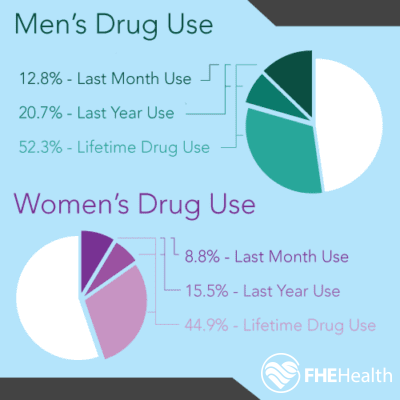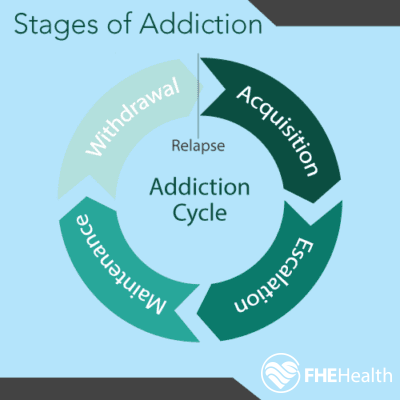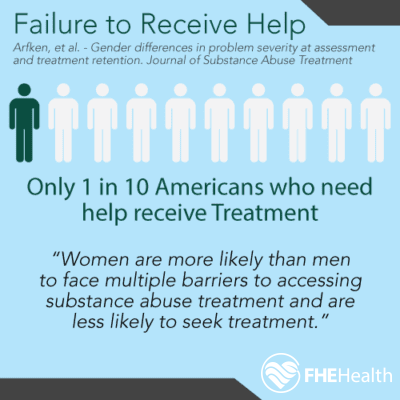
Addiction is, in many ways, a universal experience. It affects everyone, and no one is immune; addiction does not discriminate based on race, gender, occupation, or even age. Approximately 20 million Americans suffer from a substance use disorder of some form, and that includes men, women, high powered executives, stay at home parents, college students, senior citizens, and everyone in between.
However, despite the ubiquity of addiction, it doesn’t affect everyone in the same ways. Scientific research has actually identified numerous differences in how addiction impacts men and women. For men, the power of addiction can be influential, contributing in physical, emotional, and behavioral ways.
The Prevalence of Addiction in Men
 In the United States, men and women are both susceptible to drug addiction. However, prevalence does differ between the genders.
In the United States, men and women are both susceptible to drug addiction. However, prevalence does differ between the genders.
52.3% of men aged 12 and older try illicit drugs of some sort, with the most common being marijuana, hallucinogens, and cocaine. 12.8% of men used illicit drugs in the last 30 days, while 20.7% experimented at least once in the past year. These figures are somewhat higher than those for women; among women aged 12 and older, only 44.9% try drugs at some point in life, 15.5% experimented in the last year, and only 8.8% sampled drugs in the past month. Rates are higher on a per-drug basis, as well; there are no illicit drugs that women tend to abuse at a higher frequency than their male counterparts.
Women are also less likely to abuse pain medication. In the U.S. currently, around five million men report pain medication misuse in the last year. However, men are far less likely to abuse sleeping aids and barbiturates, with men making up only 45% of those admitted into treatment.
However, recovery for some substances does tend to improve for men. Quitting smoking, for example, is far easier for them than for women, with smoking cessation products assisting over 20% of men versus just 14% of women.
The Development of Addiction

In general, addiction is characterized in stages: acquisition, escalation, maintenance, withdrawal, and relapse. For men, acquisition and escalation are often slower processes than in women. However, men are often more likely to engage in risk-taking behaviors, leading to an increased likelihood to experiment or try potentially-dangerous substances. Men are also likely to sample drugs or alcohol to reinforce standard perceptions of masculine roles, possibly contributing to higher usage trends in males.
Use tends to accelerate and stabilize faster for men; the addiction frequently sets in at lower levels, making it easier for men to create an ongoing habit – even though substance use affects women to a higher degree. In some studies, it is indicated that dopamine is released in higher quantities for men when using drugs than it is for women. This neurotransmitter plays a central role in the reward center of the brain, and is thus a key component in addiction. While it takes a smaller amount of substances to affect women, the sensations of use may be stronger in men.
When it comes time to quit, men typically exhibit greater symptoms of withdrawal than women do, making it harder to fight through the abstinence period. However, when quitting is a possibility, men are less likely to relapse, and more likely to stay clean for a longer period of time. In some ways, this is biological, as addiction sets in over a longer time frame than for women, but may also be behavioral, due to the lingering societal vestiges of the man as the provider. However, the likelihood of relapse will often differ based on outside factors, like lifestyle, relationships, support system, and even career.
Risk Factors for Addiction
Risk factors for addiction remain fairly constant between men and women, with circumstances playing a deep role in whether or not a substance use disorder develops. Common risk factors for both genders include:
- Parental alienation in childhood
- Lack of parental supervision during childhood and the teenage years
- Availability and access to drugs
- Poverty
- Social relationships and peer pressure
- Genetic predisposition
- Substance abuse in the home
- Physical or sexual abuse in childhood
/su_column]
While these sorts of factors do not necessarily result in drug abuse or any kind of behavior problems in adulthood, they do correlate with drug experimentation and addiction later in life. One study found that of a sample of over 2,000 participants from an urban hospital, over 95% experienced some form of childhood trauma. For men, who are often raised to keep emotions inside, it's not uncommon to attempt to mask feelings of anger, pain, and isolation with substance use.
Seeking Treatment for Men

Men are more likely to forego treatment due to perceptions of career and familial obligations. For those who are breadwinners, taking time off of work and investing cash flow into a treatment program seems like an impossibility. Men may also be less likely to admit to their shortcomings or disclose emotional weakness, leading to a lack of willingness to get help. However, research indicates that men are more willing to seek rehabilitation when mandated by the court or urged by an employer or family member.
Studies regarding therapeutic outcomes remain very split, with some alcohol-related studies indicating that women have better clinical experiences, while surveys regarding illicit drugs often imply that men are in a better position. However, regardless of exact numbers, recovering from any addiction is an uphill battle, and it is never easy to leave behind a serious habit, particularly one that affects both the brain and the body in such strong ways.
Treatment for Men at FHE Health
For men facing addiction, FHE Health is here. We understand the unique experiences and struggles confronting men with substance use disorders, and we are able to provide help that makes a difference.
With programming customized to the elements that vary between genders, ages, and even levels of life experience, it is our mission to satisfy the needs of those from all walks of life. Please contact us at (833) 596-3502 for immediate help for drug and alcohol addiction.






